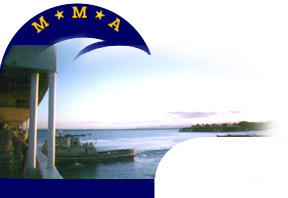
Captain's Log for Wednesday, 2 February 2000
|
As of 0700 Eastern Standard time, 1200 GMT and 1300 ship time, the Empire State was enroute to Barcelona, Spain and located at 37 degrees 12 minutes North Latitude, 011 degrees 17 minutes East Longitude. That put the ship approximately 50 miles east of Cape Bon, Algeria. We were steering a course of 272 degrees, making good a speed of 13 kts. The weather was partly cloudy with winds out of the west southwest at 3 knots. Seas were 3 to 5 feet and the ship was riding well. The air temp was 60 degrees and the sea temp was 60 degrees. Barometric pressure was 1026 millibars of mercury. Depth of water beneath the keel: 272 Meters. CAPTAIN'S LOG Guest Captain, Will Haynes (Bourne, MA), wrote today's Log. He is a faculty member in the Department of Marine Engineering and is the Engine Training Coordinator on board. "Last night I announced the results of the initial Cadet Engineer's Qualification Examination (CE's). This exam is the second most important one that Marine Engineers will take while they are at the Massachusetts Maritime Academy, surpassed only by the US Coast Guard Third Assistant Engineer License examination that they must pass in the spring of their Senior year. The CE's exam is the last in a four test sequence that is designed to assess qualifications progress and practical competency to operate high-pressure steam plants. Needless to say the prospect of this examination elevates anxiety levels. The first test in the series, the Wiper's Qualification Exam, is administered to fall semester freshmen in the Introduction to Marine Engineering Course. The test covers basic safety information such as the use of shipboard fire-fighting and damage control equipment, the use of personal protective devices such as sight and hearing protection and shipboard emergency escape routes and procedures. Students must pass the Wiper's exam in order to be permitted into the engine room unescorted. The next two exams, the Fireman's and Oiler's Qualifications Tests, detail the operation of the main boilers, auxiliary machinery and systems and engineering watch standing skills and safety. These are given on a cadet's first and second sea terms. The Cadet Engineer's Examination is the capstone test and must be successfully completed by the conclusion of 1/C Sea Term. It is a prerequisite for the US Coast Guard License. So, any engineer who fails this important examination will not sit for his license and will not graduate on time. The examination is difficult. Questions explore every aspect of steam plant operations and include sections on engineering maintenance requirements and techniques, operating procedures and practices, equipment start-up and shut down sequencing and engineering plant emergency response and casualty control. Naturally, cadets grow more anxious as the time for this exam approaches. I am happy to report the results of the first test; ninety-three per cent passed with and an average score of eighty-three . I'm confident that the few who didn't make it this time will catch up and pass when the exam is given again on February 11th and 18th." Lcdr Will Haynes Reading Professor Haynes' report illustrates why we sometimes bristle when landlubbers call this voyage a "Cruise". All the MMA sea terms are rigorous academic exercises filled with just plain hard work. While cadets may have a total of six days off in some exotic foreign ports, they also work 12 and 15 hour days, seven days a week, for over a month and a half for the privilege. Liberty is over...we are back to work. See you tomorrow. QUESTIONS FOR THURSDAY 03 FEBRUARY 2000 GEOGRAPHY: What famous mountain range is located in the north of Spain? SCIENCE: As the Empire State continues her journey she will pass through some large groups of floating 'seaweed'. Is seaweed really a 'weed'? HISTORY: Spain has been a member of NATO since 1982. What does NATO stand for? MATH: What is the complement of an angle of 51 degrees? What is the supplement of an angle of 35 degrees? ANSWERS FOR WEDNESDAY 02 FEBRUARY 2000 GEOGRAPHY: Majorca. SCIENCE: The Continental Shelf, The Continental Slope, and The Ocean Floor. HISTORY: General Francisco Franco. The war ended when Franco took Madrid in 1939 and declared himself head of state; a position he held until his death in 1975. MATH: Complementary angles = 90 degrees and Supplemental angles = 180 degrees.
|
|
||||||||||||||||||||||||||||||||||||||||||||||||||